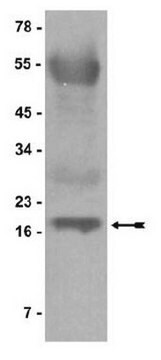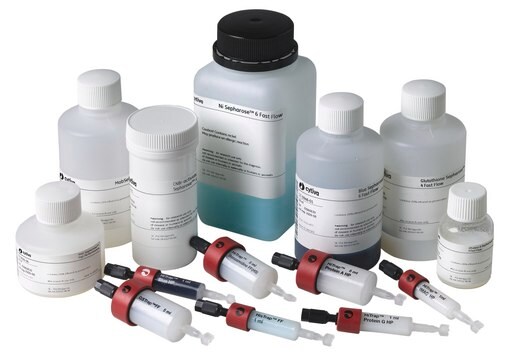16-266
Protein G Agarose, Fast Flow
Protein G Agarose, Fast Flow suitable for medium and low pressure chromatography of IgG from mouse, sheep, and rabbit, and for immunoprecipitations.
Synonym(s):
Protein G resin
Sign Into View Organizational & Contract Pricing
All Photos(1)
About This Item
UNSPSC Code:
41116133
eCl@ss:
32160801
NACRES:
NA.56
Recommended Products
form
liquid
manufacturer/tradename
Upstate®
technique(s)
affinity chromatography: suitable
immunoprecipitation (IP): suitable
western blot: suitable
shipped in
wet ice
General description
Fast flow agarose comprises highly crosslinked agarose beads or gels that can tolerate high pressures compared to standard agarose bead resins. Thus, these resins are ideal for fast protein liquid chromatography (FPLC) purification methods. They are preferred for medium to large-scale antibody purification. This product contains protein G covalently coupled by cyanogen bromide to highly cross-linked 4% agarose beads. It is stable in all aqueous buffers used in protein G chromatography.
Application
Protein G Agarose, Fast Flow has been used in immunoprecipitation. It is also suitable for medium and low-pressure chromatography of IgG from mice, sheep, and rabbits.
Quality
routinely evaluated by immunoprecipitation and purification
Physical form
water containing 20% ethanol
Storage and Stability
1 year at 4°C
Legal Information
UPSTATE is a registered trademark of Merck KGaA, Darmstadt, Germany
Disclaimer
Unless otherwise stated in our catalog or other company documentation accompanying the product(s), our products are intended for research use only and are not to be used for any other purpose, which includes but is not limited to, unauthorized commercial uses, in vitro diagnostic uses, ex vivo or in vivo therapeutic uses or any type of consumption or application to humans or animals.
Signal Word
Warning
Hazard Statements
Precautionary Statements
Hazard Classifications
Flam. Liq. 3
Storage Class Code
3 - Flammable liquids
WGK
WGK 1
Flash Point(F)
116.6 °F
Flash Point(C)
47 °C
Certificates of Analysis (COA)
Search for Certificates of Analysis (COA) by entering the products Lot/Batch Number. Lot and Batch Numbers can be found on a product’s label following the words ‘Lot’ or ‘Batch’.
Already Own This Product?
Find documentation for the products that you have recently purchased in the Document Library.
Customers Also Viewed
Boshi Wang et al.
EBioMedicine, 41, 320-332 (2019-02-13)
Hyper-activation of TGF-β signaling is critically involved in progression of hepatocellular carcinoma (HCC). However, the events that contribute to the dysregulation of TGF-β pathway in HCC, especially at the post-translational level, are not well understood. Associations of deubiquitinase POH1 with
Romina J Walter et al.
Cell death & disease, 13(2), 168-168 (2022-02-23)
Enhancement of Wnt signaling is fundamental for stem cell function during intestinal regeneration. Molecular modules control Wnt activity by regulating signal transduction. CD44 is such a positive regulator and a Wnt target gene. While highly expressed in intestinal crypts and
Jie Hu et al.
FEBS letters, 592(11), 1893-1904 (2018-05-22)
SAMHD1 inhibits Hepatitis B virus (HBV) replication by reducing the intracellular dNTP levels. However, how SAMHD1 phosphorylation is regulated to abrogate its restriction of HBV replication in hepatoma cells is poorly understood. Here, we show that HBV replication and SAMHD1
Julia Bolik et al.
The Journal of experimental medicine, 219(1) (2021-12-18)
Metastasis is the major cause of death in cancer patients. Circulating tumor cells need to migrate through the endothelial layer of blood vessels to escape the hostile circulation and establish metastases at distant organ sites. Here, we identified the membrane-bound
Phosphoinositide-dependent kinase-2 is a distinct protein kinase enriched in a novel cytoskeletal fraction associated with adipocyte plasma membranes
Hresko, R. C., et al
The Journal of Biological Chemistry, 278, 21615-21622 (2003)
Our team of scientists has experience in all areas of research including Life Science, Material Science, Chemical Synthesis, Chromatography, Analytical and many others.
Contact Technical Service












